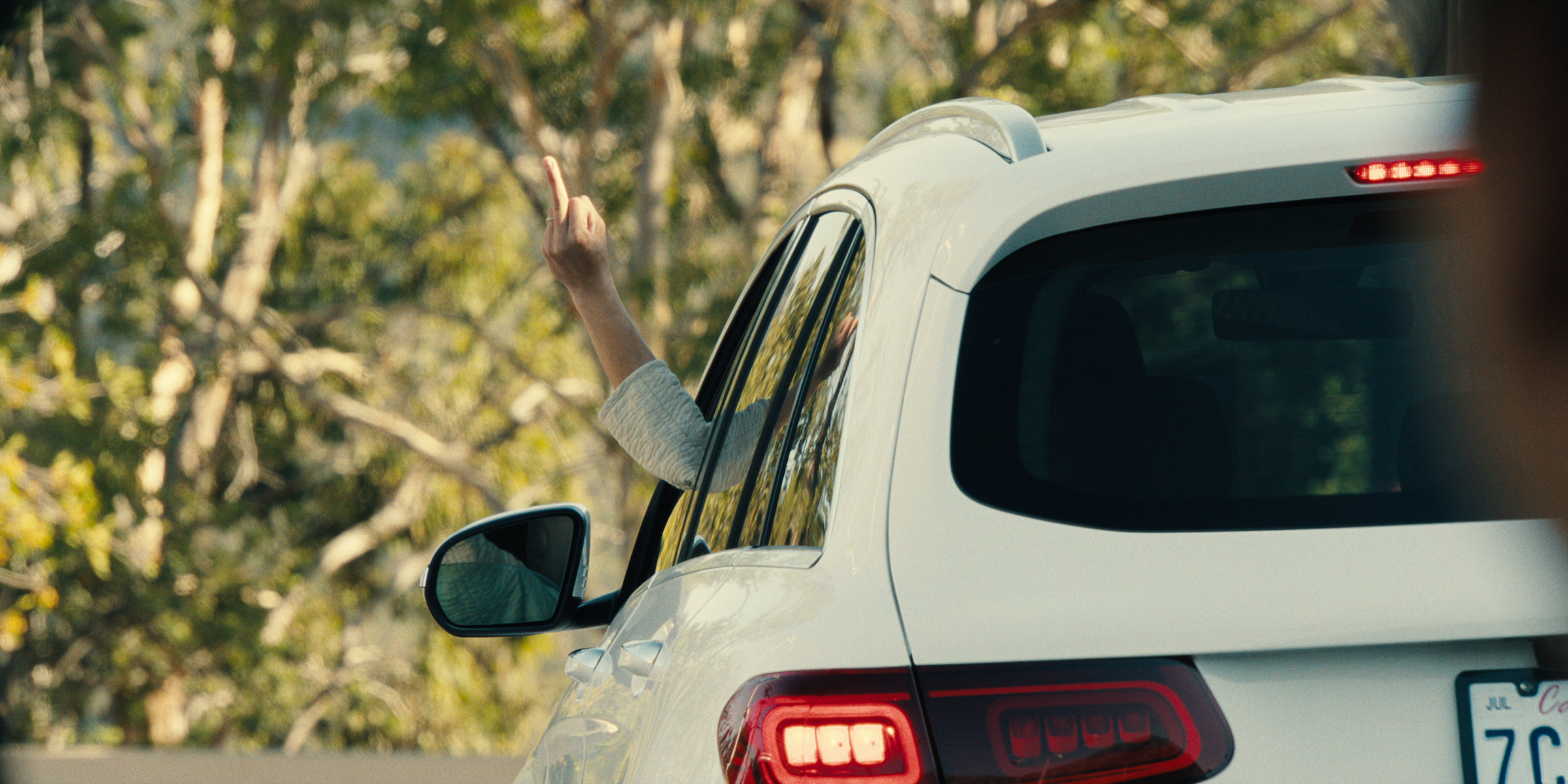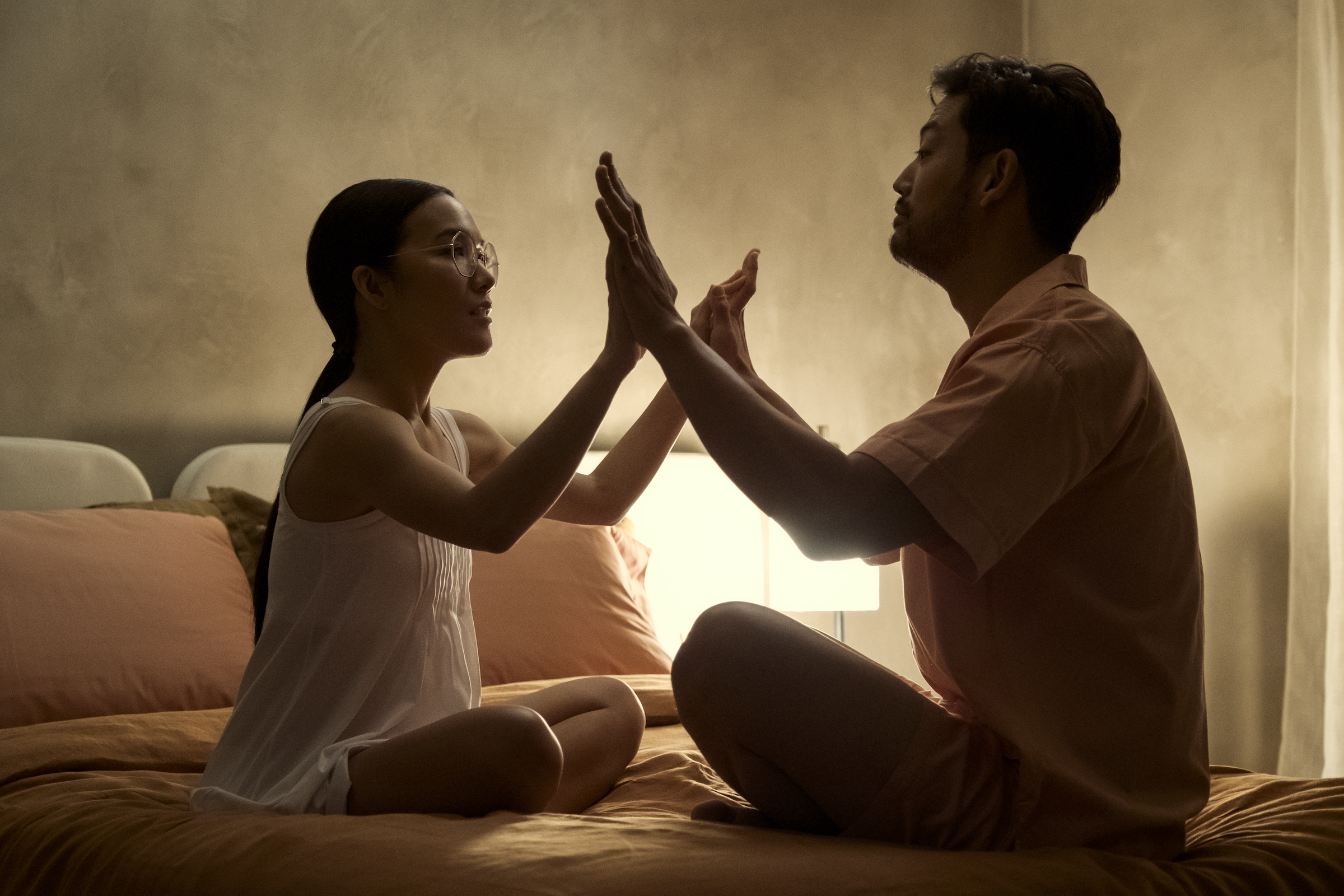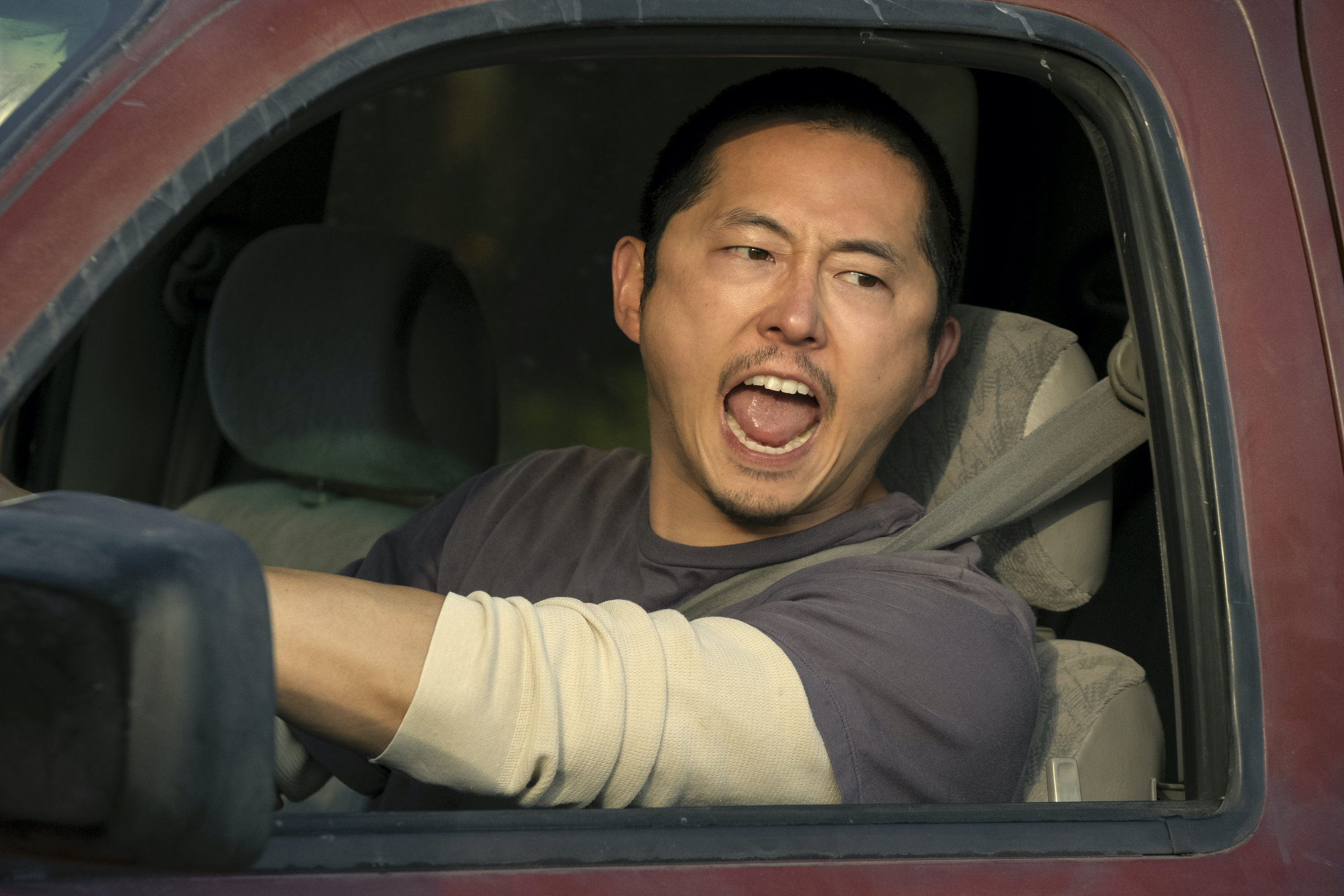In a joint video interview, Ali Wong and Steven Yeun are color-coordinated to match the title of their new show, Beef, a dark A24 comedy releasing Thursday on Netflix. Wong wears a crimson suit with a matching lip, while Yeun wears a white button-up over a white T-shirt. Their background is a Pieter Aertsen painting of a meat stall, which showrunner Lee Sung Jin included in his PowerPoint pitch for the show—an image chock-full of fresh beef.
The show opens on the titular beef, a road rage incident between Wong’s Amy, an overworked, self-made entrepreneur with a seemingly charmed life, and Yeun’s Danny, a depressed, struggling contractor with a chip on his shoulder. The sustained honk of Amy’s white SUV lights a longstanding fuse within both drivers.

Beef finds its two protagonists each fed to the gills with the little difficulties of daily life—think: forgetting a receipt when you try to return something, the seat belt locking when you pull it too fast, passive aggressive jabs from your mother-in-law. But the road rage confrontation brings their quotidian frustrations to a rolling boil. The original incident escalates into an increasingly absurd feud: Amy tags Danny’s truck with “I can’t drive”; Danny plots to set fire to Amy’s SUV. Danny harasses Amy at a panel she’s speaking on; Amy sleeps with Danny’s younger brother.
Yeun has previously noted how modern life can feel more geared toward individuals now than in the past—with less being shared among people. The events of Beef force Amy and Danny to look outside of themselves, and to each other—even if the journey there is rough.
“We rage until we loop out to the other side,” Yeun tells TIME. “And you’re like, ‘Oh, I’m the same as you. We’re broken in the same way.’”
Neither Yeun nor Wong thinks that Beef is trying to say any one specific thing. The show takes one moment—a road rage incident in a big-box store parking lot—with two specific characters at particular points in their lives, and lets the events unfold organically from there.
But, Wong says, what she took away personally from her experience on the show was that “it’s just really important to connect with people, in a healthy way, when you can.”
“Make an effort to do that. Because if you don’t, you might fall into this situation where, in an effort to connect, you’re being really self-destructive,” she says.
Beef is Lee’s meditation on a ubiquitous sadness, inherent in so many people, that burns into anger. At one point while making the show Lee (who goes by Sonny) broke down in tears talking about his then-4-year-old goddaughter, Lily.
Lily has yet to experience the dark emotion that Beef revolves around and Lee hated to think of her ever feeling that way. For him, it’s a feeling that never goes away. The best way that he could describe it was that it felt like the ground, “but up here, by your chest.”
“It almost feels to me like it is the core, the root of this reality,” Lee says. “It’s very pervasive-feeling. And it feels like a catch-22, this ever-elusive quest for wholeness.”
In the third episode, titled “I Am Inhabited By A Cry” (a nod to the Sylvia Plath poem “Elm”), Amy attempts a therapist-recommended intimacy exercise with her himbo husband, George (Joseph Lee). The pair sit cross-legged on their bed, attempting to stare into each other’s eyes for 30 whole minutes. Amy’s glossy, Zen facade cracks, and George tries to peer beneath it.

“There’s this feeling I’ve had for a long time,” Amy confesses. “I don’t remember when it started. I can’t pinpoint exactly when or why. But it feels like the ground, but right here,” she says, pressing her hand to her sternum. “It never goes away.”
But her plea to simply be heard falls on deaf ears. George pivots, in his irritatingly positive way, responding, “I know a lot of people who battled depression and won.” Amy’s face falls.
In “Elm,” Plath writes, “I am inhabited by a cry./ Nightly it flaps out/ Looking, with its hooks, for something to love.” In Beef, both Amy and Danny are looking, hooks out, for something to love—or someone to love them, unconditionally.
Read More: Beef Is Smart, Wild, and Darkly Funny. Why Doesn’t Netflix Make Shows Like This Anymore?
Lee is deeply intentional with his allusions to art and literature throughout the show. The title of each episode is a reference to some cerebral, thought-provoking quote or another. Episode 1, “The Birds Don’t Sing, They Screech in Pain,” is a snippet of a Werner Herzog quote from the 1982 documentary Burden of Dreams. Episode 2, “The Rapture of Being Alive,” is a Joseph Campbell quote from his 1988 docuseries The Power of Myth. And the title card of each episode (other than the first one) is a previously unseen painting by the artist David Choe, who plays Danny’s wily cousin Isaac.
Toward the end of the series, Danny asks Amy about the tattoo on her lower back. It’s a reference to Joseph Heller’s novel Catch-22, she says. For as long as she could remember, that’s what being alive has felt like: a catch-22. “Can’t have form without space,” Amy says. “Can’t experience light without dark. And any time you try to hold on to one thing, it slips away.”
“I’ve never been able to describe this feeling inside of me,” Danny responds, “but I think that’s it.” After what feels like forever of pointless fighting, each character—lonely and adrift in their own way—feels seen, and not judged.

“It was like, ‘Oh, this is somewhat of an organic end to this deep desire to connect to each other,’” Yeun says. “If anything, the extremes it goes to feels like the bounds of how deeply they intensely love or want to connect to each other.”
The stars and the show’s creator agree: despite their string of bad behavior, neither Amy nor Danny are inherently bad—or good, for that matter. “They’re just people, and time and circumstance put them in these situations,” Wong says. “They made these choices. And I don’t really fully fault them for any of it.”
Later in the series, we catch a glimpse into Amy and Danny’s complicated childhoods. A young Amy learns that her parents didn’t intend to have her, and realizes her father is having an affair. Danny is bullied on the playground, and overhears his family’s financial worries. Their parents—Vietnamese and Chinese and Korean, respectively—are immigrants. As adults, Amy laments her parents’ lack of communication, and Danny feels pressure to provide for his.
Lee waffles back and forth over his characters’ goodness or lack thereof. To him, no one ever feels like they’ve changed that much. “You’re still the kid that you were,” he says, and then you make choices, and suddenly you’re here.
Read More: The 47 Most Anticipated TV Shows of 2023
In mid-March, Beef premiered at South by Southwest, where Lee said that a quote by Carl Jung, the Swiss psychiatrist, guided him throughout the making of the show: “One does not become enlightened by imagining figures of light, but by making the darkness conscious.” (“Figures of Light” would go on to become the title of the finale.)
“In our pursuit for wholeness or betterment, there’s this attempt to almost extricate our shadow selves and not look at the dark side of things,” Lee says. “It’s really in the messiness and in the cracking open of things and being just naked in front of one another that you really start to see, oh, there is an ugliness in all of us.”
Lee, Wong, and Yeun found that camaraderie in a meta sense, too, while working on set. This was Wong’s first dramatic lead, and on the first day of rehearsal, Oscar-nominated Yeun told her “I don’t know anything you don’t know.” Yeun learned firsthand from Wong, a stand-up comedian with three Netflix specials under her belt, how to use comedy to access pain. And Lee’s collaborators helped him feel free and supported in his vision.
“Maybe that is the only way to deal with this, is if we collectively acknowledge, ‘Hey, let’s all look at the shadow together and realize that it’s OK,’” Lee says. “That you’re not alone or weird or that you don’t have to carry so much shame.”
More Must-Reads from TIME
- Caitlin Clark Is TIME's 2024 Athlete of the Year
- Where Trump 2.0 Will Differ From 1.0
- Is Intermittent Fasting Good or Bad for You?
- The 100 Must-Read Books of 2024
- Column: If Optimism Feels Ridiculous Now, Try Hope
- The Future of Climate Action Is Trade Policy
- FX’s Say Nothing Is the Must-Watch Political Thriller of 2024
- Merle Bombardieri Is Helping People Make the Baby Decision
Contact us at letters@time.com